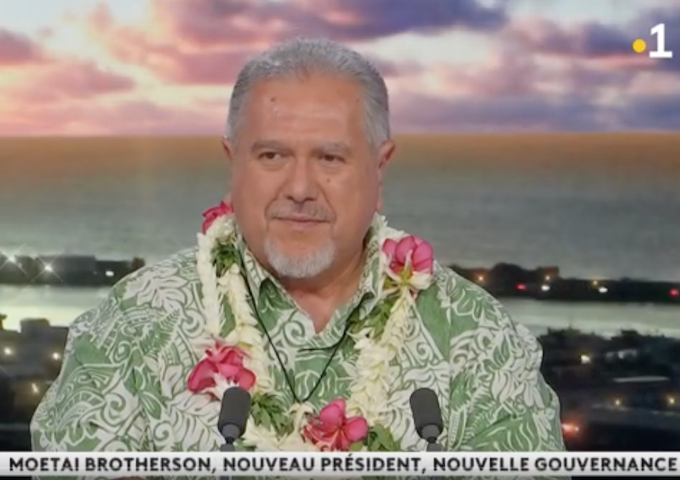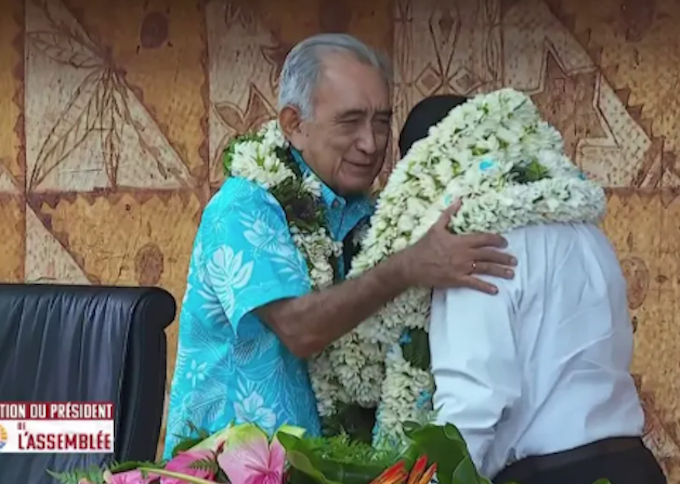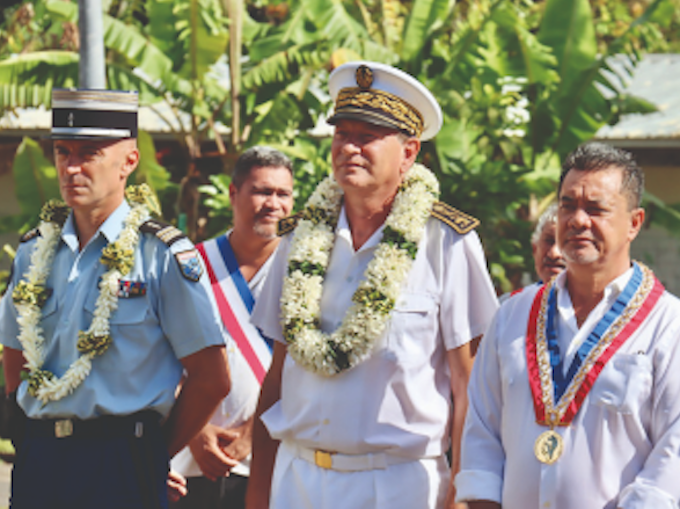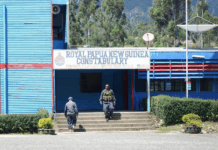
SPECIAL REPORT: By Ena Manuireva
Mā’ohi Nui and the Pacific region has witnessed a historical moment at the Territorial Assembly when Oscar Temaru, leader of the pro-independence party Tavini Huira’atira, sat briefly in the most important chair of the chamber.
He presided over the election of the new Speaker (president) of the House.
This honour was his as the eldest member of the Territorial Assembly at the age of 78.
- READ MORE: Tahiti’s pro-independence ‘blue wave’ back at helm with decisive win
- Moetai Brotherson elected as new President of French Polynesia
- Other Tahiti election reports
In his return to the Assembly, he was put in the highest seat of the House from which he had been axed as a member of Parliament in 2018 by a French court which convicted him of a “conflict of interest” in the Radio Tefana affair.
A sweet revenge for the once persona non grata politician in front of the High Commissioner representative of the French administration, along with the two pro-French senators — and the entire autonomist political platform.
Another no less significant moment that took place when the ballots for the electing the Speaker were counted, 41 were for the only pro-independence candidate, Antony Geros, against 16 who abstained.
This might have come as a surprise to the autonomist alliance of édouard Fritch-Gaston Flosse to see the three non-aligned autonomist members of the assembly give their votes instead of abstaining.
Working with new administration
However, those non-aligned autonomist members have publicly announced that they would work with the new administration.
The other point about the three non-aligned members is the hope of being offered a ministerial position for one of their group, an answer will come when the newly elected President of the territory presents his cabinet in five days.

In his opening speech, Speaker Geros reminded the House about historical facts over the many political battles and strife that Tavini had had to endure — mostly instigated by the French state.
He also said that the past 10 years had been a “journey in the desert” for the new local government.
When asked whether he was worried that his speech against the French administration could send the “wrong signal” to Paris, he said the young new Tavini members of the Assembly needed to know how they got to where they were and the sacrifices that were made by the forefathers of the independence party.
They needed to know the past of their party to understand the future of the country.
It has also been a happy reunion for Roch Wamytan, president of New Caledonia’s Congress and pro-independence leader, who came in person to congratulate and support his old friend Temaru for what he has achieved.
Brotherson’s new administration
Moetai Brotherson was elected president of Mā’ohi Nui with 38 votes ahead of the outgoing president Édouard Fritch (16 votes), and Nicole Sanquer from the non-aligned party — and the first woman to seek the presidency — (three votes) and Benoit Kautai from Flosse’s party, who quickly withdrew his name.
The majority premium won by the Tavini settled the outcome as already predicted.
Any member of the Assembly can stand as a presidential candidate and present their programme. Undoubtedly the autonomist candidates will reiterate their allegiance to the French Republic.
Moetai Brotherson will make his speech and continue to form his cabinet. He has already given the names of some of the members of his cabinet and the following names could be added to his new cabinet.
He promised gender parity in his government with a hint of more women which he can still achieve. He is adding another woman, Manarii Galenon, who is likely to be Minister for Solidarity, Housing and Urban Development.
The Budget and Finance minister would be Tevaiti Pomare which is an interesting choice as he is known to be an A here ia Porinetia supporter.
Some negotiations must have been held between Tavini and the A here ia Porinetia.
The last name that we are hearing of is Cedric Mercadal as Health Minister.
Most of the new ministers are of high calibre in terms of academic achievement but might be rather light on their political engagement and experience.
President Brotherson will need to find two more women to reach gender parity and stay under the number of 10 ministers that he announced previously.
Although he has five days to form his government, all the ministers should be known by Monday.

Priorities for new government
The biggest challenge for this government and Tavini Huira’atira party as a whole will be to work with the French administration whose financial help to the country is around 200 billion Pacific francs (NZ$3 billion) a year.
Despite the long and historically skewed relationship between the independence party and the French state, open discussions with other potential investors, especially China, should not put any strain between the new local and the French administrations.
It has become increasingly necessary for this new government to be close to all the mayors of Mā’ohi Nui which is what the French administration had already put in place around 30 years ago.
This relationship between municipalities and the French state has allowed the latter to have a direct communication with the representatives of the populations, be their only intermediary, and to set up agreements of inter-dependence between the parties involved.
The new government will try to seek this close relationship, particularly with the mayors of the Marquesas archipelago since it is planning to use those islands as an essential lever to boost tourism.
The Marquesas archipelago is only a three-hour flight to Hawai’i, which welcomes 8 million tourists a year, and the new government believes that by offering the Marquesas as a new tourist destination it will boost both the local and the whole of Mā’ohi Nui’s economies.
Managing to bring in 3 percent of this new market in search of authenticity would be a substantial financial addition and would more than double the number of tourists visiting the territory yearly to around 300,000.
Infrastructure objective
In anticipation of this, building the necessary infrastructure — such as airport, wharves, parks, hotels — to welcome this potential tourist mass could only be achieved by working with the mayors.
On the other hand, the more pressing matter for this government will be to visit and help the town of Te’ahupo’o, located on the west coast of the main island of Tahiti, that was hit by torrential rain and flooding 10 days ago.
It left about 60 households desperate to find somewhere to live.
Te’ahupo’o is also the town where the 2024 Paris Olympic Games surfing competition will take place.
Tackling urban delinquency and homelessness around the capital Pape’ete is also part of the new administration’s programme which ties up with the warm welcome that Ma’ohi Nui wants to offer visiting tourists.
The last word is for Oscar Temaru about concerns that the independence party might face a repeat of 2004 and the “politics of intimidation”.
He says the French administration is witnessing an increase in popularity of Tavini Huira’atira and will think twice about trying to “shut the taps”.
Paris is also aware that all the political institutions in Ma’ohi Nui — the Assembly and the government — and in France (the three deputies seated in France’s National Assembly) have independence members to represent the people.
It is Temaru’s wish to also win the senatorial elections in order to strengthen his claim to self-determination.
His only worry is whether Paris might change the constitution during their governance. But at the moment, Ma’ohi Nui is allowing “the young people to govern this country”.
Ena Manuireva is an Aotearoa New Zealand-based Tahitian doctoral candidate at Auckland University of Technology and a commentator on French politics in Ma’ohi Nui and the Pacific. He contributes to Asia Pacific Report.












































